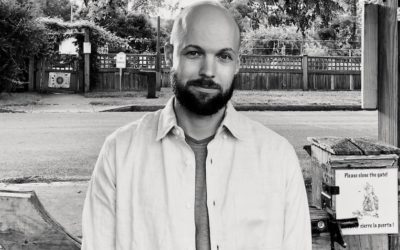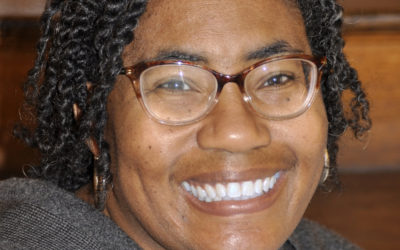Writing While Parenting is a collection of essays that explores the connections between poetry and parenting. How did you discover that you wanted to write about the overlap of these two subjects? Many of these essays come from a monthly column that I started writing...
Interviews
Getting to Know Carolyn Oliver, Author of Inside the Storm I Want To Touch the Tremble
When did you first encounter poetry? How did you discover that you wanted to write poems? Both my parents read aloud to me and my siblings when we were small, and so my first experiences with poetry included children’s verses with strong rhymes and narrative...
Getting to Know Margot Wizansky, Author of “Wild for Life”
When did you first encounter poetry? How did you discover that you wanted to write poems? My mother read poems to me, When We Were Very Young, “James James/ Morrison Morrison/ Weatherby George Dupree/ Took great/ Care of his mother/ Though he was only three” and...
Getting to Know Wendy Drexler, Author of Notes from the Column of Memory
When did you first encounter poetry? How did you discover that you wanted to write poems? I’ve always loved words, and while I worked professionally as an editor for many years, I didn’t discover until decades later that I might have something of my own to say and a...
Getting to Know Erica Charis-Molling, Author of How We Burn
When did you first encounter poetry? How did you discover that you wanted to write poems? I first discovered poetry in middle school. I was drawn to the delightful strangeness of e.e.cummings’ language, the quirky sage voice of Emily Dickenson, and the vivid, dramatic...
Getting to Know Mikko Harvey, Author of Let the World Have You
When did you first encounter poetry? How did you discover that you wanted to write poems? When I was about 18, I developed a weird hunch that I wanted to write poetry, but I didn’t really know how to get started. One problem was that I hadn’t found any poets whose...
Getting to Know Michael Ansara, Author of What Remains
When did you first encounter poetry? How did you discover that you wanted to write poems? I fell in love with poetry in high school but as a reader, not a writer. Over the years I would read poetry, primarily what I think of as the “classics” for well-educated...
Getting to Know Jason Adam Sheets, Author of A Madness of Blue Obsidian
When did you first encounter poetry? How did you discover that you wanted to write poems? Kahlil Gibran’s The Prophet, when I was 18. It spoke deeply to something within me that lit this proverbial lamp of remembrance, something about the metaphysics of poetry...
Getting to Know Kevin Gallagher, Author of The Wild Goose
When did you first encounter poetry? How did you discover that you wanted to write poems? My earliest encounters with poetry were through the Bible. As a young person raised Catholic the poems and songs of that ritualistic life were my first major exposure to...
Getting to Know Dianne C. Braley, Author of Unheard Whispers
“What excites me most about Unheard Whispers, my collection of poems on growing up in an alcoholic home, is that part of the proceeds is going to the Robert F. Kennedy Community Alliance here in Massachusetts and their division that helps children and families affected by addiction. In the disease of addiction, so much funding and support go to the addicts themselves. While this is needed, the children of addicts often are forgotten.” — Dianne C. Braley
Getting to Know Jon D. Lee, Author of IN/DESIDERATO
“IN/DESIDERATO is a book-length poem that, at its heart, is a meditation on the nature of the world we’re leaving behind, both in terms of our collective successes and our failures. The title is a Latinate mangling of my own that loosely translates to ‘un/desirable,’ meaning both the light and dark opposites of that phrasing, and the book is dedicated to and largely addressed to my children.” — Jon D. Lee
Getting to Know Martin Edmunds, Author of Flame in a Stable
“I fell in love with words; they ran away with me. Discipline followed, born of delight—in ‘getting the words right”: a slow apprenticeship. It takes time to learn how to name your gait, ask for a lead on a canter, command a lope, a trot, a fourteener, scuttle the chatter to trip a tetrameter, settle back into ballad measure.” — Martin Edmunds
Getting to Know Kate Hanson Foster, Author of Crow Funeral
“Writing poetry for me is a kind of meditation. I try to access this strange place in my brain, and I don’t always have the key. I think my better poems are when that door opens and I start piecing phrases and thoughts together.” — Kate Hanson Foster
Getting to Know Kristian Macaron, Author of Recipe for Time Travel in Case We Lose Each Other
“I wasn’t just writing about the earth, but the earth as a body, deep time and time travel, but more so about myself and my heart—learning to see myself through stages of recognition, voice, transformation and renewal. In retrospect, much of this was a study of spending time in the unfamiliar to allow what feels like disaster or quest to turn into a renewed understanding of strength, certainty and self-love.” — Kristian Macaron
Getting to Know José Araguz, Author of Rotura
“One of the things I like to make time for is writing out a poem by hand. It’s something I recommend to folks as it places us in a similar silence as the act of writing a poem ourselves. It also slows us down and has us paying attention to words.” — José Araguz
Getting to Know DeMisty Bellinger, Author of Peculiar Heritage
“I first fell in love with poetry as a child. Poetry was everywhere, as it is for all kids: in nursery rhymes and playground jump rope songs. When I learned that people wrote books—poetry and otherwise—I knew that I wanted to write.” — DeMisty D. Bellinger
Getting to Know Rebecca Kaiser Gibson, Author of Girl as Birch
“It’s been astonishing to have entered each poem individually, and then to discover that they were interacting with each other. I love the dynamic process of discovering connections I didn’t realize were there. It’s as if the poems have a life of their own, and reach across the book to reflect on one another.” — Rebecca Kaiser Gibson
Getting to Know Anjalequa Birkett, Boston’s new Youth Poet Laureate
“It took me a while to understand that a poet isn’t defined by complex metaphors or the way they present their work…a poet is only defined as and by the person whose name and essence stamp those stanzas and similes. So in short, don’t let what you think hold you back. Let what you know push you forward.” — Anjalequa Birkett
Getting to Know AR Dugan, Author of “Wanted: Comedy, Addicts”
“People say (poets say) they write poems because they have to. It’s not a choice. Poetry is how they are able to move through the world. Poetry helps me get out from under the farce of the world. It helps me get out from under the weight of my existence, and my complicity in the cycle.” — AR Dugan
Getting to Know Tamiko Beyer, Author of “Last Days”
“My hope is that this project inspires other writers and artists, especially BIPOC folks, queer people, disabled people, and others who have been marginalized in the literary and art communities, to develop new ways of releasing work into the world. There is a myriad of ways we can dream up to engage with capitalism differently and to create and deepen community. That’s what I’m most excited about.”
Getting to Know Interrobang Letterpress
“You hold type in your hands, and that type is energy, captured. Energy that was input to make type can sit waiting in cases for decades, and be used over and over with no additional energy input needed.”





















